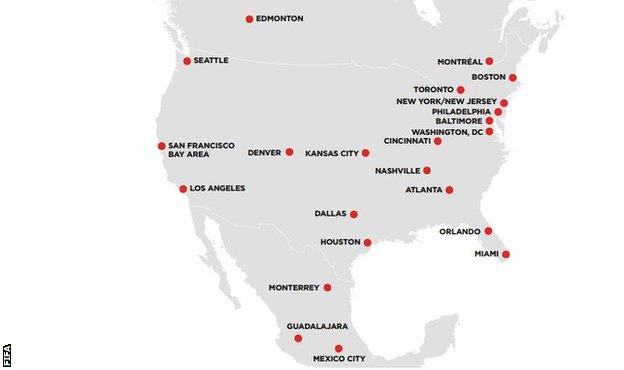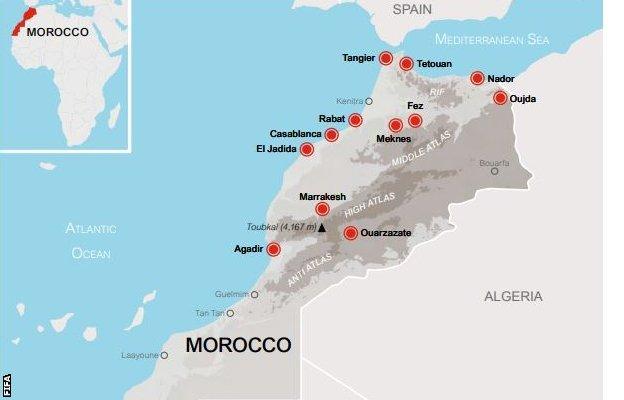Fifa World Cup 2026: Canada, US & Mexico v Morocco
- Published
One side has David Beckham lobbying and Donald Trump menacing on social media. The other is promising a "European" World Cup in Africa.
But who will prevail on Wednesday when a vote is taken to decide on the hosts of the 2026 Fifa World Cup?
Morocco and a combined 'United Bid' between the United States, Canada, and Mexico are fighting for the right to stage the biggest World Cup ever held - with 48 teams playing 80 matches over 34 days.
After the controversial award of the 2018 and 2022 tournaments to Russia and Qatar respectively, Fifa has promised a "more open and transparent" vote this time.
But what are the two bids offering? How will the vote work? And who is going to host the World Cup in eight years' time?
Long-haul flights & three nations - the United Bid

The 23 potential World Cup 2026 venues in Canada, the United States and Mexico - 10 of the 17 USA cities would eventually be used
Former England captain David Beckham says, external "great countries" deserve the World Cup and that he would go as a fan if the United Bid succeeds.
But US president Donald Trump took a slightly different tack, issuing a veiled warning on Twitter to "countries that we always support" in case they think about voting for Morocco on Wednesday.
Both Mexico and the United States have already hosted World Cups on their own, the former in 1970 and 1986, and the latter in 1994. Canada staged the 2015 Women's World Cup.
US Soccer president Carlos Cordeiro says the bid would generate $14bn (£10.3bn) in revenue and make an $11bn (£8.1bn) profit for Fifa
Of the 16 host cities, 10 would be in the United States with the others split evenly between Canada and Mexico.
The final would be at the 84,953-capacity MetLife Stadium, which is home to NFL sides the New York Giants and the New York Jets.
The distance between the most northern venue (Edmonton) and the most southern (Mexico City) is almost 3,000 miles.
That compares to 1,900 miles in Russia (Kaliningrad to Ekaterinburg) this summer and more than 2,800 miles in Brazil in 2014 (Manaus to Porto Alegre).
Fifth time lucky? The Morocco bid
'We wouldn't bid if we weren't 200% convinced we can deliver' - Morocco bid chief
Four times they have bid, and four times they have been overlooked. But could it be different on this occasion for Morocco?
A Fifa bid evaluation task force ratified their proposals, but did note concerns over stadiums, the availability of accommodation, and the travel network.
However, bid chief Hicham El Amrani said he was confident the country's infrastructure "could deliver" and made play of the North African nation's position, nine miles from the southern tip of Spain.
"A Moroccan World Cup is not just an African World Cup," he told BBC Sport. "It would also be almost a European World Cup. We're just a few hours' flying distance from capital cities across Europe."
Games would be in 14 stadiums - nine of which need to be built - located in 12 cities.
Every host city is located within a 550km radius of Casablanca.
The final would be in the 93,000-capacity Grand Stade de Casablanca.
It would only be the second World Cup on the continent, after South Africa hosted in 2010.
Morocco hosted 16 teams for the 2018 African Nations Championship in January and February, and also staged the Fifa Club World Cup in 2013 and 2014.

The potential venues in Morocco - there would be 14 stadiums across these 12 cities
So what will happen on Wednesday?
The 68th Fifa Congress will be held in Moscow, with proceedings starting at 07:00 BST. The vote itself is the 13th item on the agenda, so bed in for a long day.
Things are going to be simpler than previously, though. After the controversy around the award of the 2018 and 2022 finals to Russia and Qatar respectively, Fifa's 22-strong executive committee will no longer vote on behalf of the membership.
Instead, the two bids will make a final 15-minute presentation and then the 211 Fifa member nations - minus Canada, Mexico, Morocco and the US - will each cast a vote.
The option of 'neither bid' is also on the ballot. In the unlikely event that gathers 50% or more of the vote, the process will be reopened and European and Asian nations will be permitted to bid, having initially been disbarred under Fifa's host continent rotation policy.
More likely is that neither the Moroccan or 'United Bid' will claim the 104 votes needed for an outright majority, and a second vote will be taken in which delegates much choose one or the other.
And should the 'United Bid' win narrowly, that might well lead to the Moroccans reviving their grievance against the fact that US territories Guam, American Samoa, the US Virgin Islands and Puerto Rico get a vote.
So where will the World Cup be in 2026?
BBC sports news correspondent Richard Conway
After years of covering Fifa politics and voting decisions I've learnt one thing: follow the money.
This vote for the 2026 World Cup has been taken out of the hands of a small cabal of Fifa executives and entrusted to its 211 member associations.
It is supposed to reduce the risk of corruption - something Fifa desperately needed to do following past controversies.
So where does the money come in this time?
The US, Canada and Mexico joint bid is promising Fifa associations vast profits of $11bn (£8.2bn). That compares with around $6bn (£4.48bn) from Morocco.
That kind of cash - divested over many years and relied on by many smaller football associations to survive and develop the game - makes a compelling argument.
So too do promises of a risk-free build-up in three countries where infrastructure is strong and the stadiums are already built.
The people connected to the two rival bids have exuded confidence in recent days.
But money talks in Fifa land. I expect it will again on Wednesday.